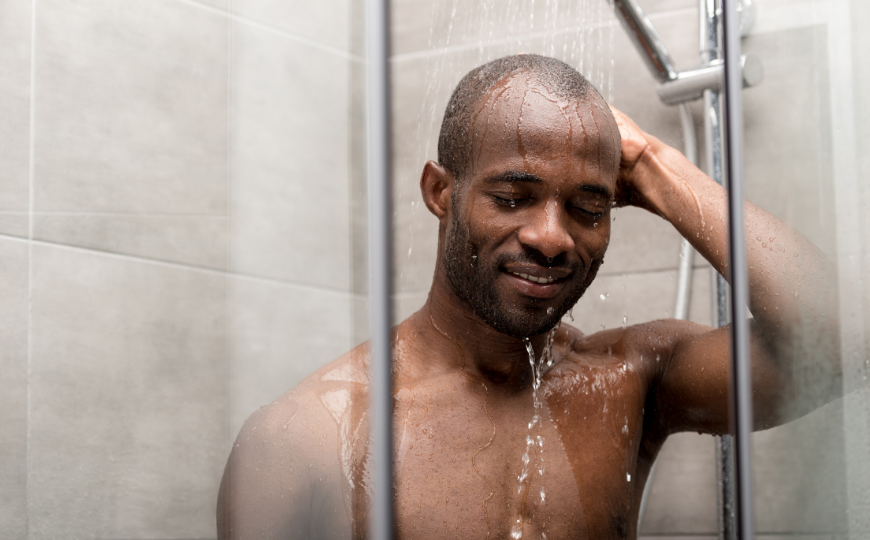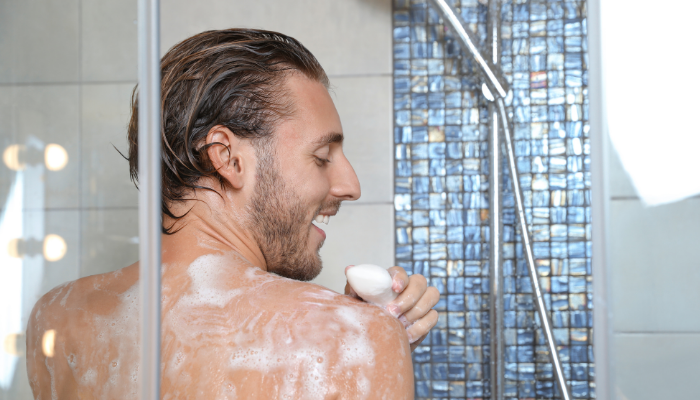We don’t adhere to stereotypes here at The Bald Gent, but if we did, it would be highly unlikely that we’d run ourselves a cold shower in the morning.
After all, pop culture has told us that freezing cold shows are equal to an act of torture, reserved for those attending military boot camps or ‘psychotics’ if you believe George Costanza from ‘Seinfeld.’ It’s even synonymous with curbing an active libido, which is hardly a ringing endorsement for showering under cold water!
However, if you were to start your morning shower hot and turn it cold for the last few minutes, you’d actually find that this is surprisingly refreshing. It offers some interesting health benefits too, which is why elite-level athletes are known to use cold water and ‘ice baths’ as a way of soothing sore muscles and aiding recovery.
Hey, even James Bond loved a nice cold shower, so they’re definitely not as bad as they are often portrayed. We’ll address the potential benefits of showering with cold water below, while asking how you can make this practice work for you!
Getting Started With the History of Cold Water Therapy
We tend to forget that the concept of warm or hot water is relatively new, with the Ancient Greeks having first developed heating systems for their public baths.
For much of human history, however, people bathed in cold water (unless they were fortunate enough to live near a natural hot spring, of course).
In fact, ice cold baths were so commonplace that people persisted with them even after the invention of rudimentary water heating systems. The tough-as-teak Spartans were particularly scathing, believing hot water to be for those who were weak and unmanly.
Of course, the Spartans barely bathed once a year, so it was a little easier for them to promote the virtues of cold water cleansing. However, we must remember that cold water dousing was also incorporated into a number of ancient cultures and civilisations, most commonly as part of spiritual and religious ceremonies.
Take native tribes in South America, for example, who would often alternate between sitting in a sweat lodge (or sauna to you and me) and immersing themselves in an icy river during religious ceremonies.
This was similar to the practice undertaken by Finnish folk during the first century, with this pastime referred to as “avantouinti” or “ice hole swimming”.
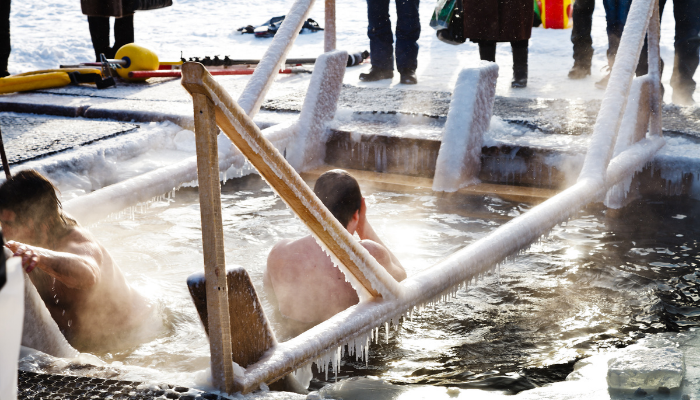
Ancient Russian civilisations also took frequent plunges into ice cold rivers and lakes, with this practice considered to promote general physical health and provide some form of spiritual cleansing.
The Japanese practice of Shinto (which is still relatively popular in modern times) also required people to stand under an icy waterfall as part of the so-called “Misogi” ritual, which was also thought to cleanse the spirit.
However, it wasn’t until 1820 that the potential healing properties of cold water therapy first became apparent, thanks to the work of a German farmer named Vincenz Priessnitz.
At this time, Priessnitz began touting a new medical treatment called ‘hydrotherapy’, which leveraged ice cold water to cure a range of physical ailments. Over time, he turned his family’s homestead into a sanatorium and soon found dukes, counts and duchesses amongst his clients, with this helping the practice of hydrotherapy to gain popularity throughout Europe.
From here, it reached the promised land of the US, where a host of celebrities began to use hydrotherapy and help popularise cold water therapy amongst the mass population.
Even Charles Darwin became a main proponent of hydrotherapy stateside, as he turned to ice cold water as a way of curing many of his chronic illnesses.
Subsequently, the first hydrotherapy facility opened in the US in 1843, with this blazing a trail for more than 200 similar venues to launch stateside by the end of the 19th century.
Of course, the popularity of hydrotherapy as a frontline medical treatment dwindled throughout the 20th century, primarily as doctors turned to drugs as a way of combating a growing array of illnesses. However, it remains widely used as a way of treating targeted ailments, particularly strained muscles and broken bones.
OK – So What are the Benefits of Cold Water Showers?
The latter point is particularly interesting, particularly given the fact that elite athletes often use cold water therapy (such as ice baths) to help sooth muscles and aid recovery immediately after performance.
This is arguably the biggest health benefit of hydrotherapy, with cold water thought to hasten recovery after strenuous exercise by reducing temperature, blood flow and inflammation within the tissues of affected muscles.
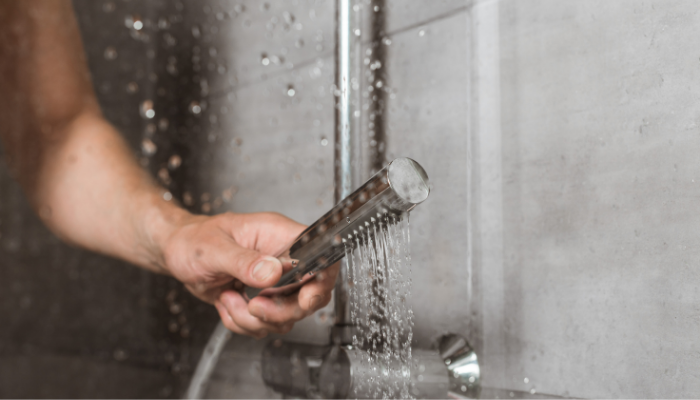
Although some studies have challenged this idea, it’s widely accepted and utilised by athletes across the globe. This is also just one of many benefits associated with cold water baths and showers, so here are a few more to keep in mind:
It Wakes You Up and Helps You Focus
Most of us feel a little sluggish upon waking in the morning, but there’s no doubt that being doused in ice cold water shakes you from your slumber and focuses the mind. In particular, it requires you focus on the most elemental human faculties, potentially enabling you to relax your muscles more effectively and be more mindful of your breathing and mental wellbeing before you start the day!
Improve Circulation by Alternating Between Hot and Cold Water
We’ll talk about how to utilize cold water to your advantage below, but there’s no doubt that quickly alternating between warm and cold water results in improved circulation. This can be done with relative ease too, as you simply need to start your daily shower with warm water before transitioning to ice cold water for the final couple of minutes.
Strengthen Your Natural Immunity Levels
According to a 1993 study conducted by the Thrombosis Research Institute in England, respondents who took daily cold showers saw an increase in the number of virus fighting white blood cells. This highlighted the capacity of cold water and hydrotherapy to boost your body’s natural immunity over time, while it’s an incredibly simple way of creating more robust physical health.
Reduce Stress Over an Extended Period of Time
Regular exposure to cold water can help with managing feelings of being overwhelmed, as it places a certain stress on your body known as ‘hardening’. Over time, this improves the resistance of your nervous system and allows it to become more accustomed to moderate stress levels.
Increase Willpower and Mental Fortitude
The notion of stress is an interesting one, as this can trigger a cascade of hormones that result in a ‘flight’ or ‘fight’ response within the human body. So, when you’re first hit with a burst of cold water, your body’s likely to flinch and move away from the source of physical stress. This means that it takes a great deal of willpower and mental strength to endure cold water for an extended period of time, so practicing this regularly can create a more robust mindset.

It’s Good for Your Skin
Last but by no means last, ending your shower with cold water can also be beneficial for your skin. Warm water and steam will open up your pores, meaning you can give your skin a deep clean, while cold water will close them up again. This way, you’ll prevent your pores from becoming clogged with other products and oils, keeping your skin healthy and clean, and maintaining your youthful appearance.
How to Get Started with Cold Showers in 3 Simple Steps
At this stage, you should understand the history of cold water therapy and the physical and mental health benefits associated with ice cold showers!
However, getting started with cold showers can still be deceptively difficult, while overcoming the initial shock of immersing yourself in ice cold water is also incredibly challenging.
Fortunately, we’ve outlined some tips to help you take your first cold shower, and hopefully leverage some of the great benefits of doing so.
Start Gradually and Familiarise Yourself With Colder Showers
If you’ve never showered in cold water before (and trust us, you’re not alone in that), it’s important that you start gradually and don’t immediately immerse yourself in ice water.
One of the best ways to achieve this is to pay attention to the existing water temperature in your home, and try to reduce this by a couple of degrees at a time when showering in the morning.
This will allow your body to become increasingly accustomed to cooler water temperatures, and you should continue this process for a few weeks before beginning to shower in completely cold water.
While this may seem a little long-winded and far removed from the calculated recklessness of James Bond, it helps your body to cope with the physical impact of cold showers and enables you to realise their long-term benefits!
Start Out Hot, Then Cool Down as You Rinse
To complete the transition to ice cold cleansing, you should start to alternate between hot and cold water temperatures during a morning shower.
As we’ve already touched on, alternating between warm and cold water definitely improves your circulation, which is one of the reasons why athletes utilise both hot and cold therapies when treating certain muscle strains and ailments.
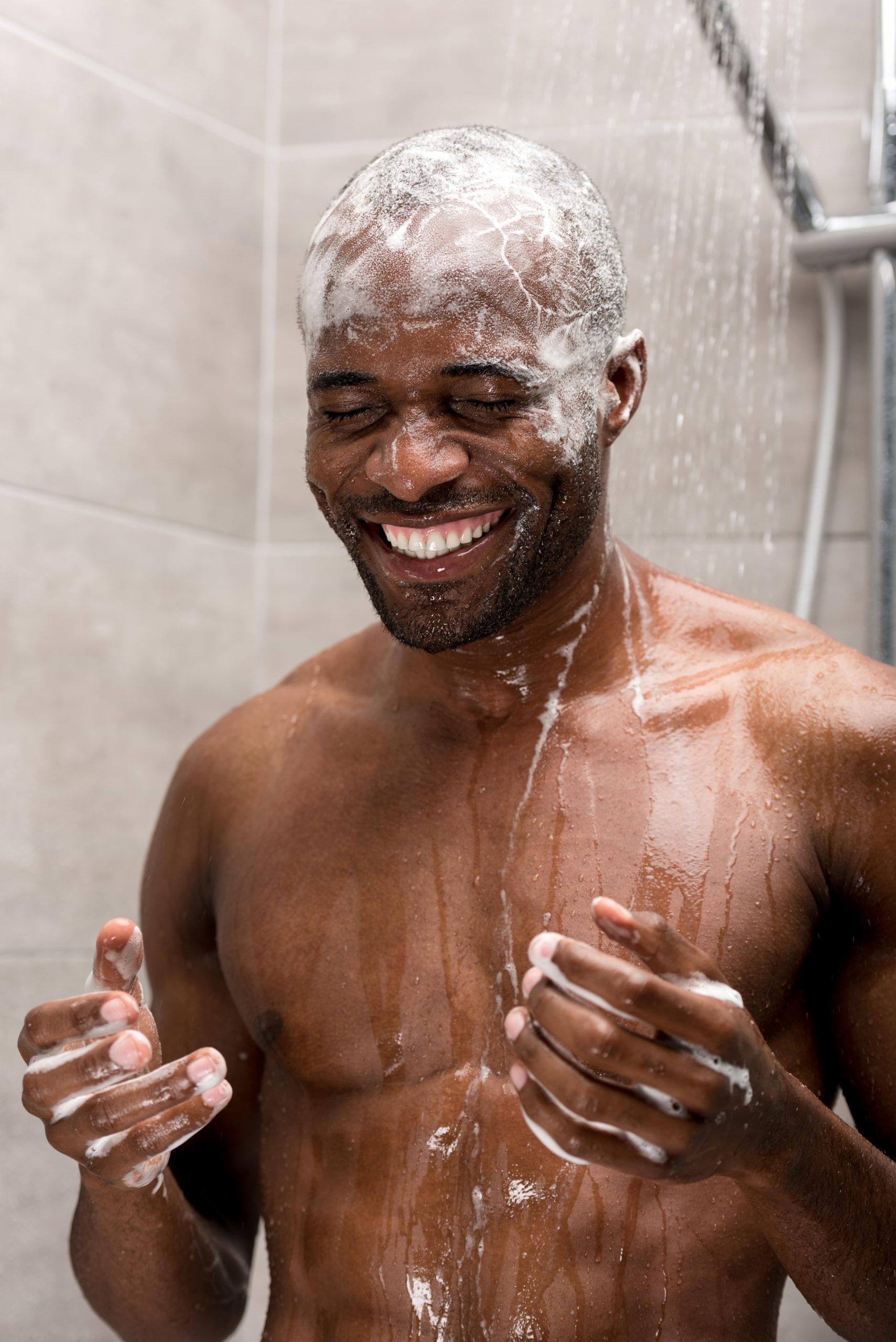 Remember, this is also ideal for your skin with warm water capable of opening your pores for cleaning and cooler jet streams closing them again, preventing them from becoming clogged by other products.
Remember, this is also ideal for your skin with warm water capable of opening your pores for cleaning and cooler jet streams closing them again, preventing them from becoming clogged by other products.
However, this process also improves your body’s fundamental capacity to tolerate cold water for extended periods of time, while enabling you to naturally lower the temperature of your shower as part of your wider cleansing routine.
So, how exactly does this work? Well, in simple terms, you should start out in a nice warm shower, albeit one that may be a little cooler than you’re used to having lowered temperature gradually over time.
You can then shower and lather yourself with shampoo and body wash as usual, only lowering the temperature and introducing cold water as you begin to rinse. This way, you’ll only have to endure the cold water burst for a couple of minutes or so..
Of course, you can extend the amount of time that you spend under cold water as you become more accustomed to the practice, but this is an excellent way of managing temperature and building your body’s resilience when starting out.
Beware of Any Existing Health Conditions
We have to impart a small note of caution here, particularly given the initial shock and physical stress that can be caused when immersing yourself in cold water.
Make no mistake; this can be highly detrimental to some health conditions, with heart disease offering a relevant case in point. Certainly, a cold shower can initially increase your pulse rate and place a strain on the nervous system, so it’s wise to avoid this if your heart is particularly vulnerable.
The same rule applies to high blood pressure, as the sudden contraction in your blood vessels caused by a surge of cold water has the potential to trigger a stroke in vulnerable individuals.
Similarly, we’d recommend that you avoid an ice cold shower if you’re feeling particularly feverish or overheated.
The reason for this is simple; as your blood vessels must be allowed to dilate in order to release heat from your body. However, cold water causes them to constrict, potentially exacerbating your symptoms and any underlying issues that you may have.
The Last Word
We’ve all heard the horror stories about cold showers, and whoever has been in charge of marketing them has done an awful job over the years.
However, science tells us that being immersed in cold water holds a number of proven physical and mental health benefits, especially if you’re able to enjoy an ice cold shower every day.
But don’t take our word for it; try it out for yourself and see what all the fuss is about!

